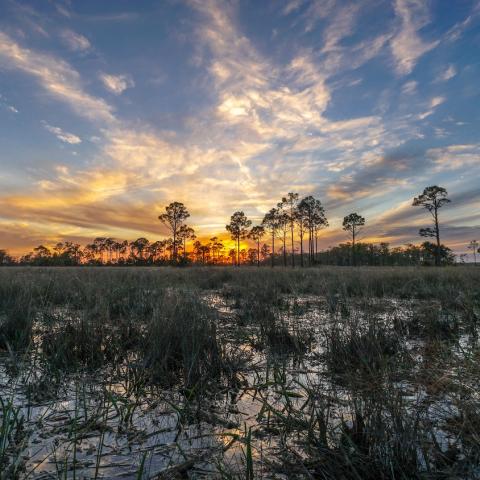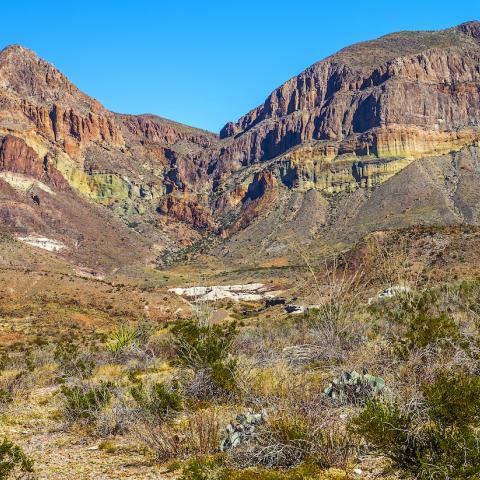
Big Bend National Park staff want to rid their park of non-native Aoudad sheep, also known as Barbary sheep/NPS
Not all the creatures that roam Big Bend National Park's more than 801,000 acres are native, and the National Park Service wants to do something about that.
For the next 30 days, the park staff will be taking public comments on a plan to manage these non-native animals. To protect the park’s natural and cultural resources and the visitor experience, the Park Service proposes to manage aoudad (Barbary sheep) and feral hogs using lethal means. Control of these populations is proposed as these non-native species compete with and consume native species, alter species composition, threaten biodiversity, and impair the visitor’s ability to experience natural conditions and scenery.
Aoudad have been in the park for the past three decades, and have increased significantly in recent years. Estimates suggest 200 to 400 aoudads now inhabit the park. Aoudads are major competitors to native desert bighorn sheep. Feral hogs are present in low numbers in the park’s northern extremity, and are expected to invade the heavily vegetated, 113-mile Rio Grande corridor in coming years. Additionally, the park wishes to prevent feral hogs from invading the Chisos Mountains, a small range within the park that contains rare montane woodlands and hosts endangered, rare and isolated native species.
The environmental assessment considers two alternatives. No-action, which would allow continued and increasing impacts from these exotic species on the park’s natural and cultural resources and the visitor experience; and the proposed action alternative. This second alternative includes limited aerial shooting (from helicopter) of aoudad and feral hogs, and ground-based live-trapping and shooting of feral hogs. Aerial control would be performed only by experienced professionals. Texas Parks and Wildlife Department has offered to provide initial aerial control of aoudad in areas of the park that are important to desert bighorn sheep conservation. U.S. Department of Agriculture and professional aerial animal management contractors are also available. Limits on timing, location, and duration of control actions, and other best practices and mitigations, would minimize undesirable effects.
Control actions would employ the most humane feasible methods. No poisons, snares, or leg-hold traps will be used. Only lead-free bullets would be used to minimize impacts to scavengers. Aerial control of aoudads and feral hogs would primarily occur during the hot summer months, when few visitors use the park’s backcountry. Aerial control would likely occur only several days per year, and a total of 20 days per year would be the maximum allowable helicopter use for all aspects of exotic aoudad and feral hog management. Ground-based control would occur during many times throughout the year, but would avoid the busier visitor use periods and locations.
The Plan and Environmental Assessment are being prepared in compliance with the National Environmental Policy Act. The plan and associated documents are available for review and download at the National Park Service Planning, Environment and Public Comment web site. The NPS prefers comments be submitted in writing on the same site. However, comments may be submitted by email to: [email protected]; by mail to: Superintendent, PO Box 129, Big Bend National Park, TX 79834, or in writing at public meetings.
Meetings for members of the public and stakeholders to learn more about the plan and environmental assessment, ask questions, and make written suggestions and comments regarding the plan will be held at the Brewster County Multi-Purpose Facility in Study Butte on February 13, and at the Sul Ross State University Morgan Conference Center in Alpine on February 14. Both meetings will begin at 6 pm and last one hour.
The public, organizations, and others are invited to submit written comments throughout the 30-day period. Comments submitted during this public review period will be considered by the National Park Service prior to finalizing the Plans and Environmental Assessment.




 Support Essential Coverage of Essential Places
Support Essential Coverage of Essential Places







Comments
Use lethal means. Get rid of all of them, as they shouldn't be there in the first place. Feral pigs need to be exterminated too, as they are especially detrimental to farm land and are reproducing out of control. I hope no one is considering 'relocating' any of these animals, as they will only cause problems in other areas. Feral pigs should have open season on them year round. Just my opinion.
The solution is obvious: Simply declare an Open Season on Aoudad Sheep and Feral Pigs.
Allow the use of semiautomatic firearms with no limits on magazine capacity.
We hunters will clean things up in short order.
If they weren't introduced by man then we should let nature take its course! The question is how did they get there in the first place? Seems like mankind's solution to every problem is killing?
Would this sheep extermination only include the National Park or would include all areas in the US with this specie such as the state park and the nearby game farms? Eradicate? Maybe not possible.
Definitely eliminate the hogs, as soon as is feasible. They are terribly destructive. If the Aoudad truly threaten native wildlife, their removal makes sense, too.
careful what you agree to----don't assume that these "sheep and feral hogs" are the only non-natives being considered. The Interior Dept. can designate Any species "non-native" anytime they have pressure from big donors or the oil industry, and then they can kill indiscriminately! Look for the hidden agenda, folks! NEVER give open-end authority to a government agency!